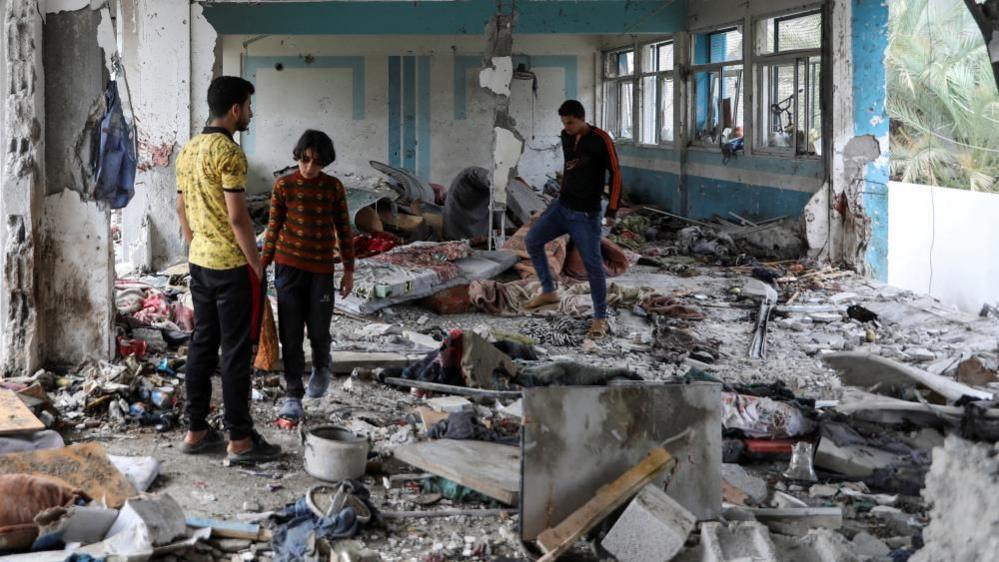Witnesses tell of 'unimaginable' Gaza shelter air strike

Israeli missiles hit classrooms on upper floors of the building in the overnight strike
- Published
In a classroom-turned-bedroom at a UN school in Nuseirat refugee camp in central Gaza, Palestinian children clamber through rubble and blood-stained mattresses.
Just hours earlier, at least 35 people were killed and many more wounded at the site in an Israeli military strike early in the morning, according to the head of the UN agency for Palestinian refugees, Unrwa.
“I saw pieces of iron flying and everything falling down. What happened to us is unimaginable,” said Naim al-Dadah from Gaza City, one of hundreds of displaced people sheltering there.
Israel’s military says it carried out a “precision, intelligence-based strike” to target between 20 to 30 Hamas and Islamic Jihad fighters who were using the school as a staging ground to plan and launch attacks.
However, 14 children and nine women were among those killed, the Hamas-run government media office says. Earlier, medics reported similar numbers to a local journalist working with the BBC.
During the war, Israel has repeatedly accused Hamas of hiding its operatives in schools, hospitals, and other buildings, using civilians as human shields – charges the armed group denies.
“All of the red lines have been crossed,” said Mr al-Dadah, suggesting that being in a UN institution had given his family no protection. He added: “The world treats us with double standards. Israel has violated all international laws.”
Israel has faced growing diplomatic isolation over its conduct of the war, with cases against it before two international courts, but insists it has acted within the laws of armed conflict as it tries to counter what it sees as an existential threat from Hamas.
On a call with journalists, the Israel Defense Forces (IDF) spokesman Lt Col Peter Lerner said that some of the Palestinian armed fighters based in the Nuseirat school had been involved in the 7 October attacks, which killed about 1,200 people in southern Israel and triggered the war in Gaza. No evidence was immediately given.
Col Lerner suggested that Hamas and Islamic Jihad operatives would have “felt relatively safe” at the building, because it belonged to the UN.
The IDF published a photo of the school with classrooms on the first and second floors marked to show the locations it said were targeted by warplanes.
To an unusual extent in this case, the Israeli military has stressed that it took steps to reduce the risk of harming civilians. “We actually called off the strike twice,” Lt Col Lerner said.
The overnight attack was the latest case of mass casualties among Palestinians trying to find safety as Israel expands its offensives in the Gaza Strip.
Some of those staying at the UN school said that they came from northern Gaza – but had heeded Israeli military evacuation orders and headed south in the early stages of the war – only to be displaced in the past month from Rafah, on the Egyptian border.
This week, the IDF announced a new ground and air assault in central Gaza, targeting what it said were Hamas fighters who had regrouped there. Its forces have repeatedly returned to parts of the Palestinian territory which they previously withdrew from.
In a courtyard of the UN school, more than 20 corpses were lined up in body bags and blankets. A journalist working with the BBC filmed several women cradling the heads and hands of their dead sons.
“It was a very harsh night,” says Ibrahim Lulu, a teenager who said his cousin, Mohammed was killed.
“My brothers, friends and I were sitting together when suddenly there was an explosion. The mattress protected me because I was sitting against the wall. All the bodies were dismembered and torn.”
Residents said the part of the school targeted was being used as a shelter for men and boys, with women and girls sleeping in a separate section. Part of the school had previously been targeted by an Israeli strike in mid-May with the IDF then saying it was being used as a “Hamas war room”.
Overnight, casualties were rushed from Nuseirat to the al-Aqsa Martyrs’ Hospital in nearby Deir al-Balah. In recent days it has been struggling to treat hundreds of wounded people following intense Israeli bombardment and shelling in the surrounded area.
The hospital had earlier reported an electrical generator failure saying that this would make it harder to treat patients.
On Wednesday, Medics from Doctors Without Borders (MSF) which is supporting the hospital described chaotic scenes there. It said that in the previous 24 hours, at least 70 dead people had been brought in, and more than 300 wounded, mostly women and children.